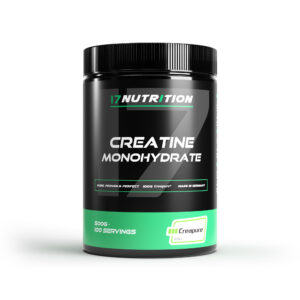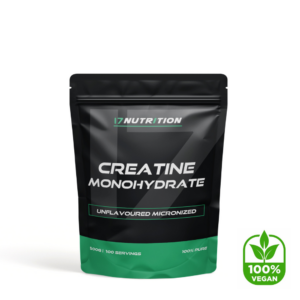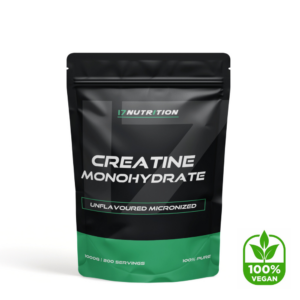Creatine
Creatine helps produce ATP (adenosine triphosphate), which is the primary energy source for our muscles. When we contract our muscles, ATP is broken down into ADP (adenosine diphosphate) and phosphate, releasing energy for muscle contraction. Creatine can increase ATP production by donating phosphate to ADP, turning it back into ATP. This allows the body to provide more energy for short, intensive activities. Therefore, with a higher amount of creatine in the body, the maximum intensity can be sustained for a longer duration.
Category
Creatine
-
Creatine
Creapure® | Creatine | 500G
Rated 0 out of 5€24.95Original price was: €24.95.€14.95Current price is: €14.95. -
Creatine
Creatine Monohydrate | Micronized | 500G (Bag)
Rated 5 out of 5 based on 2 customer ratings€11.95Original price was: €11.95.€9.95Current price is: €9.95. (€23,90/kg) -
Creatine
Creatine Monohydrate | Micronized | 1000G (Bag)
Rated 5 out of 5 based on 3 customer ratings€21.95Original price was: €21.95.€16.95Current price is: €16.95.
Need help?
What is creatine?
Creatine is a substance that is naturally produced and absorbed by our body. It is produced by the liver and kidneys from amino acids such as arginine, glycine and methionine. We can also take creatine daily from food such as meat and fish. Creatine is an important source of energy for muscles during intensive activities such as strength training and sprinting. The supply of creatine, which is mainly located in the muscles, ensures that you can maintain maximum effort during the first seconds of an exercise.
When should I use creatine?
Anyone looking to get more out of their workouts can use creatine. However, it does depend on the sport you practice. In sports involving short and intensive strength efforts, creatine can be very helpful (strength training, short sprints). But in sports where you engage in prolonged and low-intensity strength efforts, it may not be effective. Additionally, individuals following a diet that excludes meat and fish may experience better results when taking creatine since they get minimal creatine through their diet.
Is creatine harmful to you?
Although creatine is generally safe, there are some known side effects. For example, creatine can cause digestive problems, fluid retention and cramps. However, these side effects are rare and can often be avoided by drinking enough water and not overdosing. If any of these problems occur, you can also try taking a smaller dose and experiment with that.
Creatine helps produce ATP (adenosine triphosphate), which is the primary energy source for our muscles. When we contract our muscles, ATP is broken down into ADP (adenosine diphosphate) and phosphate, releasing energy for muscle contraction. Creatine can increase ATP production by donating phosphate to ADP, turning it back into ATP. This allows the body to provide more energy for short, intensive activities. Therefore, with a higher amount of creatine in the body, the maximum intensity can be sustained for a longer duration.






